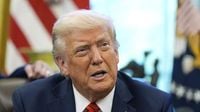On April 28, 2025, President Donald Trump signed a significant Executive Order aimed at enhancing federal English-language requirements for commercial truck drivers while also addressing the issue of fraudulent commercial driver’s licenses (CDLs). This order marks a pivotal moment in the trucking industry, as it emphasizes the necessity of English proficiency for safe and effective communication on the road.
The Executive Order builds on a previous declaration made by Trump on March 1, 2025, when he designated English as the official language of the United States. This earlier order rescinded a Bill Clinton-era directive from 2000 that aimed to improve access for non-English speakers in federal services. Timothy Burge, director of international programs at Doane University, noted that many were surprised to learn that English was not previously recognized as the official language. "The text of the executive order rescinds a previous Bill Clinton-era executive order signed in 2000," he stated.
In his latest order, Trump highlighted the critical role truck drivers play in the U.S. economy, stating, "Every day, truckers perform the demanding and dangerous work of transporting the Nation’s goods to businesses, customers, and communities safely, reliably, and efficiently." He asserted that proficiency in English should be a non-negotiable requirement for professional drivers, arguing that they must be able to read and understand traffic signs, communicate with traffic safety officials, and provide feedback to their employers and customers in English.
The Executive Order outlines specific actions to be taken by the Secretary of Transportation, who, through the Federal Motor Carrier Safety Administration (FMCSA), is required to rescind a 2016 guidance document on English Language Proficiency Testing and Enforcement Policy. The new guidance will establish revised inspection procedures to ensure compliance with the English proficiency requirement as stipulated in federal regulations.
Among the key points of the order is the directive that any violation of the English language proficiency requirement will result in a driver being placed out-of-service. This measure aims to enhance safety on the nation’s roadways, which Trump noted have become less safe due to lax enforcement of existing regulations. "My Administration will enforce the law to protect the safety of American truckers, drivers, passengers, and others," he said.
White House Press Secretary Karoline Leavitt echoed the President's sentiments during a briefing, highlighting the communication challenges truckers face on the road. "You might not know, but there’s a lot of communication problems between truckers on the road with federal officials and local officials, as well, which obviously is a public safety risk," she stated.
The Owner-Operator Independent Drivers Association (OOIDA), which represents approximately 150,000 truckers, expressed strong support for the Executive Order. OOIDA President Todd Spencer remarked, "Basic English skills are essential for reading critical road signs, understanding emergency instructions, and interacting with law enforcement." This endorsement underscores the belief within the industry that improved language proficiency can enhance safety and operational efficiency.
However, the implications of declaring English as the official language extend beyond the trucking sector. Critics, including Burge, argue that this move may not significantly impact students or educational institutions. Burge explained that the order does not mandate businesses to operate in English or require schools to instruct students in a specific language. "This also does not impact any laws that individual states might have for offering state and local level services in multiple languages," he added.
Despite concerns regarding the potential devaluation of non-English languages, particularly Spanish, which is spoken by over 56 million Americans, some educators view this as an opportunity to promote bilingualism. Joshua Pope, a professor of Spanish and chair of the Modern Languages department at Doane, warned that the official designation of English could lead to a diminished value of other languages. He emphasized, "Having English as a national official language may devalue other languages to the point where it could create a barrier to language programs."
Pope advocates for the importance of learning multiple languages, noting that it can open doors to new opportunities and foster better communication. He encourages students to become bilingual or multilingual, highlighting the personal and professional benefits that come with language acquisition.
The Executive Order and its implications are likely to be felt across various sectors, particularly among immigrant communities who may require additional language support. Burge pointed out that the order could significantly impact refugee resettlement communities, such as those from Afghanistan and Somalia, who often rely on bilingual services for integration into American society.
As the trucking industry prepares for the changes outlined in the Executive Order, stakeholders are left to ponder the broader ramifications of this policy shift. While the administration aims to enhance safety and operational standards, the conversation around language proficiency and its impact on America’s diverse population continues to evolve.
In summary, President Trump’s Executive Order on English language proficiency for truck drivers has sparked a multifaceted debate about language, safety, and inclusivity in the United States. As the order takes effect, its true impact on various communities and industries will be closely monitored.


